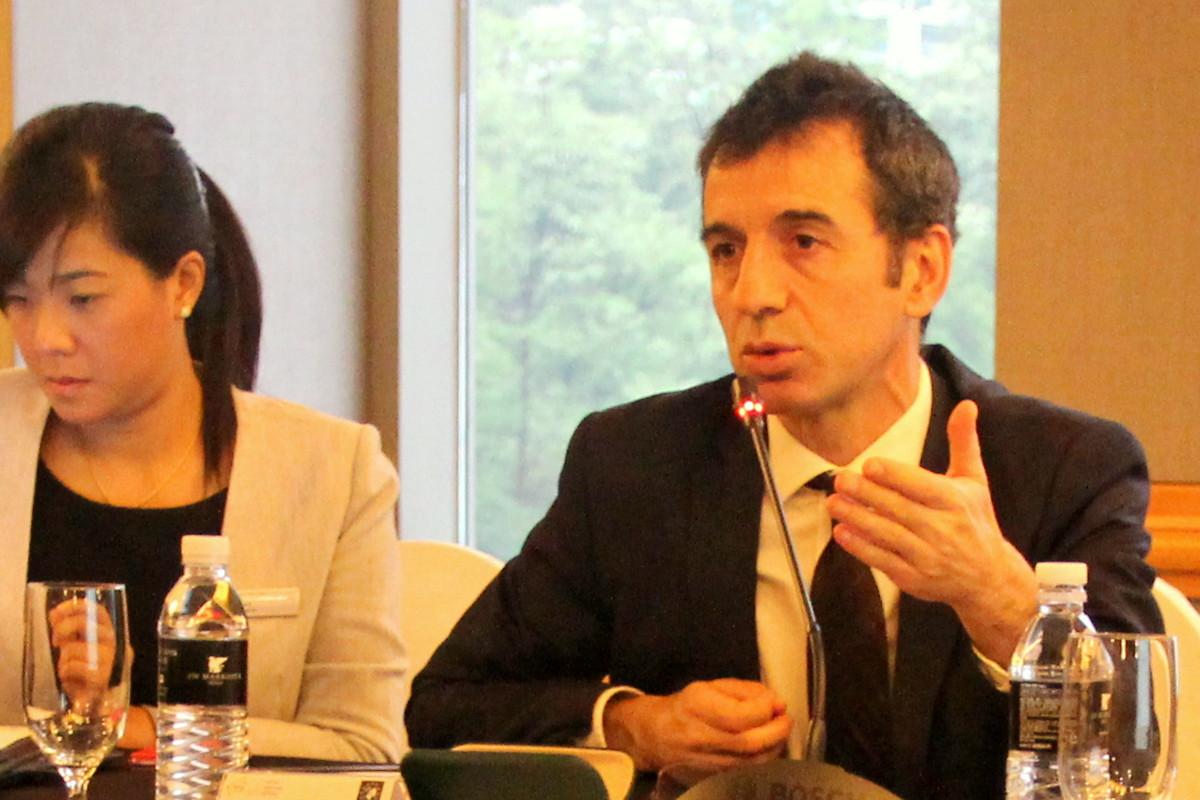Event reports
In the recent Paris Climate Change Conference, participating countries agreed to strengthen their efforts towards de-carbonization. Reducing fossil fuel consumption has been widely accepted as one of the strategies to mitigate climate change, as coal still counts for the majority of global carbon emissions. On the other hand, coal with its relatively low price and abundance remains an important source of world energy supply. Against this backdrop, the present and future uses of coal pose complex challenges in terms of climate change and energy security to decision makers.
On May 5-6, Konrad-Adenauer-Stiftung’s (KAS) Regional Project Energy Security and Climate Change (RECAP) in Hong Kong with its partners the European Centre for Energy and Resource Security (EUCERS) at King’s College London, the Atlantic Council and the Energy Studies Institute at the National University of Singapore hosted a two-day workshop in Seoul. It was the second workshop of RECAP´s “Global Energy Security and Climate Change Challenges” series, continuing a discussion on global gas markets, held in Singapore in 2015.
In the introductory session, Dr. Peter Hefele, Director of RECAP at KAS and Prof. Friedbert Pflüger, Director of EUCERS, highlighted the relevance of the workshop’s theme to global energy markets. Coal still plays a major role in global energy mix, providing fast and cheap energy for growing economies. Yet, the use of coal is a main obstacle for climate change mitigation. There is an urgent need for alternatives beyond the conventional energy sources and technologies. Thus, clean coal and the technology of Carbon Capture and Storage (CCS) deserve a closer look of policymakers.
The European Union (EU), originally founded on the basis of joint cooperation on coal and steel production between nation states, attaches still importance to coal development, as noted by Prof. Gerhard Sabathil, Head of the Delegation of the European Union to the Republic of Korea. Securing sustainable energy has been one of the priorities of the EU. Plans for an EU-wide Energy Union are under debate, reflecting different attitudes of single EU member states towards future use of coal: some states, like Poland, opt for further coal use, as their economies are highly dependent on fossil fuels, while others support transition to low-carbon energy, i.e. Germany.
Dr. Frank Umbach, Research Director of EUCERS at King’s College London presented his research findings in a recent EUCERS Strategy Paper on the Future of Coal. In the mid-term, it is predicted that coal (after oil) remains the most important energy resource globally. The energy consumption of coal is expected to increase particularly in developing countries, since coal enjoys some advantages comparing to other energy sources. Namely, it is cost-competitive and has longer availability than gas and oil resources. Facing the challenge of climate change, Dr. Umbach saw the necessary role of CCS as key and cost-effective technology both for achieving larger emission reductions from fossil-fuel use – not just coal -, and enhancing energy efficiency and expanding renewables.
The second day of the workshop was divided into three sections. In the first session, Dr. Xunpeng Shi, Deputy Head of Energy Economics Division at the Energy Security Institute of National University of Singapore, Prof. Younkyoo Kim, Director of the Center for Energy Governance & Security, at Hanyang University in Seoul, and Dr. Frank Umbach shared their insights on “Asia-Pacific’s Coal Power Industry – Opportunities and Challenges”. The energy policy in this region is apparently paradox. Thedemand for coal keeps increasing especially in China, India and Southeast Asian countries, although these countries have expressed their willingness in addressing climate change. For example, China has been constantly increasing investments in coal-related project in other countries despite an official announcement of a national-wide stop on building coal plants. This is driven not only by economic benefits, but also by geopolitical strategic consideration. In general, such contradictory acts would undermine global climate change efforts in the long run.
In the second session – “The Future of Coal, CCS and Clean Coal Technologies after Paris”, speakers agreed that on a global scale installed coal-fuelled generation capacity is expected to further increase, CCS can be part of emissions reductions strategies. Ms. Miyeon Oh, Nonresident Senior Fellow at Atlantic Council Global Energy Center and visiting scholar of Johns Hopkins’ School of Advanced International Studies (SAIS), analyzed the development of CCS in the US. There, CCS can meet economic and energy security purposes in terms of exporting CCS technology and obtaining sustainable energy supply. However, current challenges are its high operating costs and the absence of policy support. Dr. Hwan Soo Chong from the Korea Carbon Capture & Sequestration R&D Center talked about the current CCS technology development in Korea. The Korean Government has recognized the importance of CCS in mitigating climate change. Government ministries have been assigned roles in developing relevant technology. Several small pilot CCS projects and plans for transportation and capture in Korea have been already developed. Dr. Chong pointed out that CCS has much potential to grow, as nuclear energy’s security and renewables’ high costs are not widely accepted by the general public in Korea.
The third session regarding “Global Trends in Energy and the Role of Coal in the World’s Energy Mix” was conducted by Mr. Carlos Fernández Alvarez, Senior Coal Analyst at International Energy Agency (IEA), Dr. Joachim Lang, Head of Public Affairs Office in Berlin at E.ON SE, Prof. D. Suba Chandran, Professor of International Strategic & Security Studies at National Institute of Advanced Studies in Bangalore and Mr. Zorigt Dashdorj, former Minister of Mineral Resources and Energy of Mongolia.
The following key trends regarding of global energy markets can be identified:
- Fossil fuels in particular coal remain the dominant source of energy powering the world economy in the foreseeable 20-30 years
- Worldwide energy demands will continue to grow mainly driven by China and India
- Fuel mix is changing as renewables have been increasingly deployed
- More investments in renewables particularly in developing countries than in developed world have been recorded.






